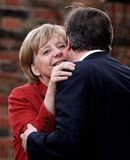 What has happened to Germany? Policy-makers and analysts have been pondering the
question for the last few years. No longer happy to be the pro-European par excellence, Germany has become more assertive, more self-centred – in others words more normal.
What has happened to Germany? Policy-makers and analysts have been pondering the
question for the last few years. No longer happy to be the pro-European par excellence, Germany has become more assertive, more self-centred – in others words more normal.
German scholar Ulrike Guerot has called the new Germany “post-Romantic”, ie more interest-based and less willing to let its history determine its future. Dominic Moisi says Germany has become “a second France.”
Part of the reason is the change among the country’s political elite. The post-war generation has left the scene and the new leaders – on the Left and Right – have little time for Helmut Kohl’s cheque-book diplomacy. Today’s German politicians are led – by the media, the constitutional court in Karlsruhe, or public opinion. They don’t lead as Konrad Adenaur did. The German media has also become a lot more euro-skeptic – criticism of the euro is now a constant feature in the press.
Economist Dirk Schumacher of Goldman Sachs has pinpointed another reason – a change in Germany’s economic outlook. If current growth rates continue, by the end of next year China will be a larger trading partner for Germany than France. If this comes to pass, a major shift will happen in Europe. The EU was built on a Franco-German axis and the logic of economic cooperation between the two countries.
Can France and Germany agree on a common policy on China or even Russia if their underlying economic relationship between these two BRICs is so different? Sure, in time China will move up the value chain and become less reliant on German exports. But that will take a while; for now, German exports to China are much more value-adding than Italy and Spain.
So the economic rationale for Germany will not change soon. Nor, then, will Germany’s rejection of its European identity. How to deal with this new Germany may be the greatest intra-European challenge for London and Paris.






Comments